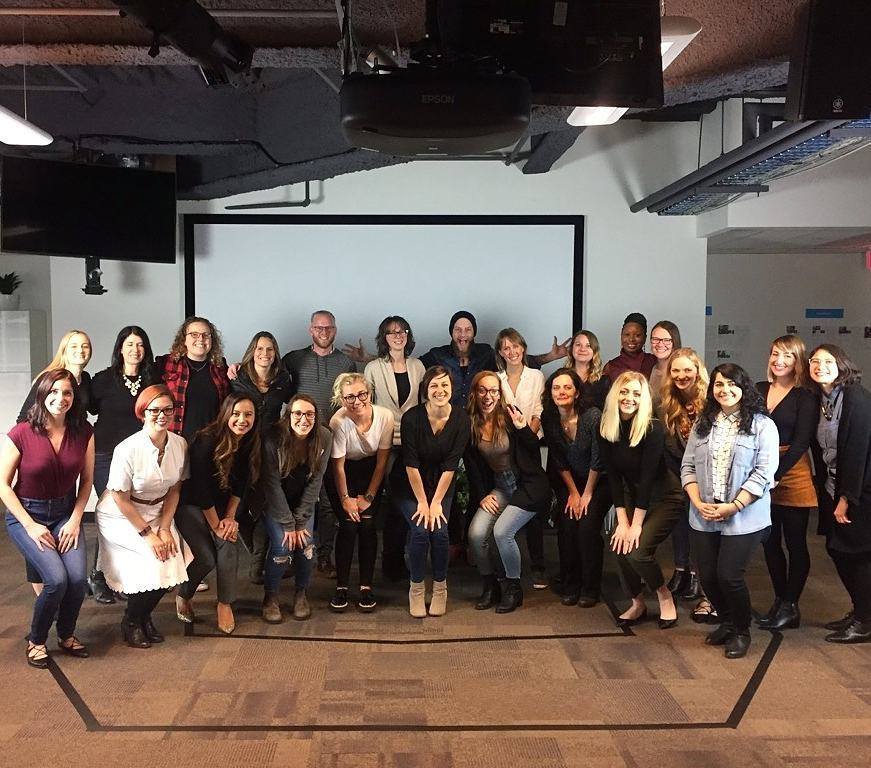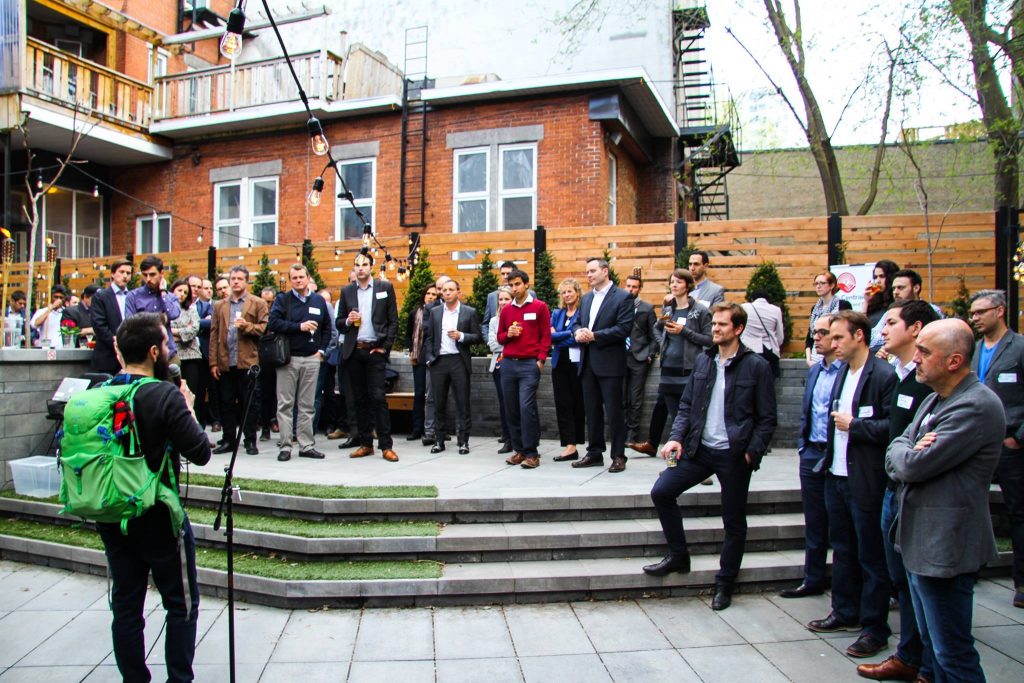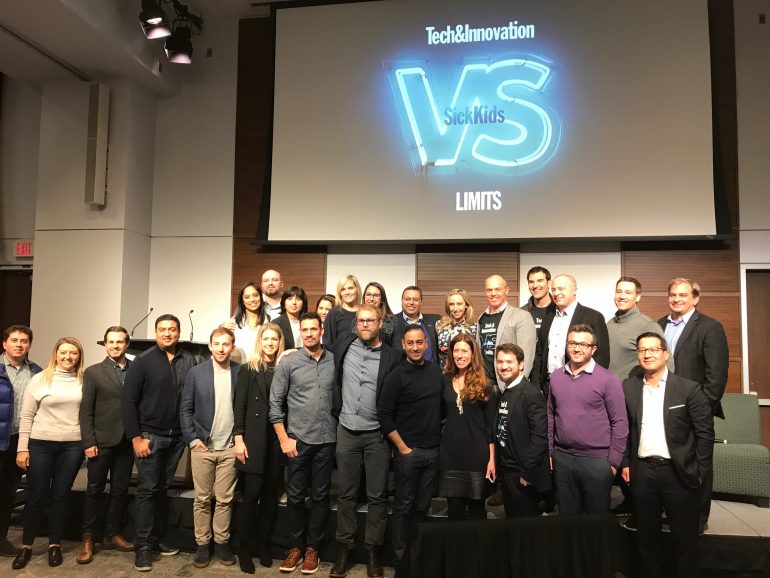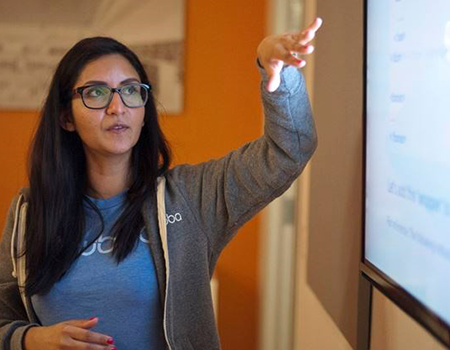Today is #GivingTuesday, an international movement promoting giving and volunteering that takes place each year after Black Friday & Cyber Monday. Marking the “opening day of the giving season,” it is a day where charities, companies, and individuals join together to share commitments, rally for favourite causes, and think about others.
Today we want to celebrate how those in Canada’s tech and innovation community are giving back and making the world a better place in hopes that it will inspire all of us to give back more, and to give back better.
While writing this article, I looked at dozens of initiatives led by people and organizations in this community- far too many to recognize here. It was incredible to see how committed people in this community are to making a difference. For the purposes of this article, I focused specifically on giving that is directed to charities and nonprofits supporting people in need, rather than contributions to the tech community.
How companies give back
Strategic giving
When companies think about their charitable giving, there should be two primary considerations. One is your vision for the world and the causes that you believe in most strongly that will help to build the future you want to see. The other is your overall company strategy, goals and challenges, and how your giving program can help you achieve these objectives.
Some programs can build value for employees, some can help founders build their networks, some can help build the company brand. Together with Roger Chabra, I wrote an article for the Betakit Ask An Investor Series in June focused on why giving back is a good idea for startups, when to think about giving back, the benefits of doing so, and choosing a cause.
When compared to ad hoc initiatives, building a strategic giving program will yield superior results, both for the cause and for the company. These are a few strategies to help build a strong giving program.
Align with employee interests
A good place to start when thinking about how your company can give back is to engage your employees and find out what they care about. As part of Uberflip’s extensive Give Back program, they took part in a charity golf tournament for Silver Creek Preschool for children with special needs because a team member had a niece at the school and was passionate about the cause.
“I highly value the opportunity to give back to the community as I definitely didn’t get to where I am by myself.”
After Myplanet’s staff started coming together to sponsor Kiva small business loans borne of an inherent desire to make change in the world, it grew to a company-wide initiative with the company organizing fundraisers to increase the number and size of loans the team could offer. At Nulogy, after an employee had a family member who was in dire need of blood, the company rallied together to donate and has since coordinated a bi-monthly blood donation drive.
Nudge.ai supports employees by providing them with time off to volunteer. Andrea Corey, VP Product Development, volunteers with the Engineers-in-Residence program where she works with an elementary classroom to bring them hands-on engineering demonstrations.
“The goals of this program are to encourage interest in engineering and STEM, but also to promote diversity within engineering and showcase a wide variety of roles models,” said Corey. “I personally do this as I know that many girls and minorities face subtle forms of discouragement when it comes to STEM, and catching them early (before junior high) is important to increasing the diversity of students enrolled in STEM programs in higher education.”
Among many other charitable initiatives, the team at Wealthsimple has raised $20,000 for a Syrian Refugee family, participated in the Heart & Stroke foundation Big Bike Ride, and volunteered at the Food Bank.
“This is a hyper-competitive space and social responsibility can help you differentiate and create a strong employee value proposition.”
Mallory Greene, CSR lead at Wealthsimple, says that charity involvement at Wealthsimple typically starts with an employee championing a cause close to their heart. “We are happy to participate in any way we can. Being involved is a win-win: we engage our employees in meaningful work, and we donate to charities doing amazing things,” said Greene. “Giving back to the community is so important to keep your employees engaged, especially if you can take that next step and tie it back to your company’s mission. It’s important for employees to feel that they are making an impact.”
Supporting the causes employees care about could be one of the most effective ways for companies to retain top talent. According to a CHIMP report, ‘Workplace Giving is Good for Business’, companies with integrated corporate citizenship programs saw a 2.3x jump in employee retention. Seventy-nine percent of millennials want to work for employers that care about how they contribute to society, and 64 percent say that social responsibility strengthens their loyalty to the employer.
Give what you’re good at
While almost any form of volunteering or donations are appreciated by charities, support can often go the farthest when a company leverages its core skills to help a worthy cause.
Traction on Demand has an extensive community engagement program that focuses on building deep partnerships with charities in need of their services. “One of our developers was so touched by the overwhelming gratitude he received from one of our pro bono clients; it was such a meaningful experience for them,” said Michelle Malpass, director of community performance. “Our program is really powerful for recruitment and retention; this is a hyper-competitive space and social responsibility can help you differentiate and create a strong employee value proposition.”
Earlier this year, Hubba launched a program with Nellie’s, a women’s shelter in Toronto, and Canada (Ladies) Learning Code, a not-for-profit championing digital literacy education. The program aims to improve tech proficiency and develop coding skills for the women at the shelter who were interested in improving job readiness.
Stephanie Little, Hubba’s manager of talent who spearheaded the initiative, says that “Hubba is involved in many social impact initiatives to give back to the community, and we’re well positioned to help remove some of the barriers that gaining decent tech skills has, such as access to computers, internet, and proper teaching.”
For 10 years, Say Yeah has sponsored HoHoTO, an annual party celebrating a more inclusive digital community and raising funds for the YWCA Toronto Girls’ Centre technology programs. Say Yeah dedicates staff time to create content, design material, improve the website, and reach out to potential sponsors and partners.
Lee Dale, CEO at Say Yeah says, “It’s a challenging effort for our business to put so many resources towards supporting the event, but I believe it’s a positive experience for the staff in working together to make an impact and, more importantly, it’s incredibly rewarding to hear first hand from the people we’ve impacted through our work.”
Pro-bono services and products enable charities and nonprofits to access resources they couldn’t afford, while offering meaningful opportunities for employees to apply their skills and take on stretch assignments.
Engage your community
Charity can be a great way to rally your community together and do something greater than yourselves. OMERS Ventures has a strong network in the tech and innovation community and has leveraged this to raise money for charities (including Loran Scholars and Children’s Hospital of Eastern Ontario) through a poker series. “It has been incredibly rewarding to see the OMERS Ventures Charity Poker Series develop into not only a meaningful networking opportunity, but one that is also giving back to so many worthy organizations.” said Nicole Kelly, community director at OMERS Ventures.
Eighty Eight regularly hosts fun events engaging their extensive network to raise money for charities. Eighty Eight managing director Erin Bury says, “We host a Disrupting with Digital breakfast event with the organizers of HoHoTO and part of the proceeds go to charity. We also hosted Startup Trivia Night where 50 percent of ticket sales went to the YWCA.”

For Toronto-based TWG’s 15th Anniversary Celebration, they’ve invited their community to help them raise $20,000 for #Tech4SickKids through a donation matching program. Matching programs like this are effective at encouraging team members and community partners to make a contribution, as people love to feel that their money is going further than they would be able to do on their own.
Tie business performance to your donation
Companies have an opportunity to raise money for charity in a way that builds strong connections with their community and creates an ongoing commitment to a strategic cause. Carrot Insights donates three percent of revenue per year to charity, which is divided evenly between the YMCA, The Heart & Stroke Foundation, and Diabetes Canada. The company’s mission is to make Canada a healthier, better nation, and this commitment aligns their business, charitable giving, and core values. From a strategic perspective, this enables the company to build partnerships with leading charity experts and thank them for their support, recruit team members who are passionate about the company mission, reinforce company culture, motivate business success, and lends authenticity and credibility to everything they do.
Bark ‘n Yapp, a peer-reviewed resource and social app for dog owners, runs a SmartStart Shelter and Rescue Program that donates $1 to a shelter on behalf of every adopted dog whose owner creates an account on the app. Since the launch of the program in March 2017, Bark ’n Yapp has donated and helped raise over $2,000 for dog shelters.
Authentically building charity into your brand is a wise move for leaders looking to engage and inspire.
Long-term, companies can tie a charitable donation to the success of their company through an equity donation to The Upside Foundation of Canada. To date, over 180 companies across Canada have shared their future financial upside by joining Upside. The process is simple, and typically involves the donation of stock options or warrants that are converted to cash when a liquidity event occurs. That cash is then donated to the charities of the company’s choice.
Roy Pereira, CEO of Zoom.ai, says, “Our team is proud to be able to say that we have made a commitment to giving back: it’s an important part of our employee value proposition. As a founder, I’ve gained a lot from being part of The Upside Foundation community. Pledging to give back with Upside is a smart thing for all founders to do as it requires no cash upfront, but can create massive value in the long-term.”
Charities that have benefitted from member company exits to date include the Mentoring Junior Kids Organization, East York Learning Experience, Princess Margaret Cancer Centre, and PEI Literacy Alliance.
Tying your charitable contribution to a business metric ensures that your goals are aligned, and that your giving is sustainable for the organization. Committing to a giving program up front can build goodwill from employees, customers and the community.
Select a cause you deeply care about
One way to strategically build a social responsibility program is to go “all-in” on a specific cause. The best causes align both your business purpose and activities, and your charitable and community giving programs.
At Unbounce, the team is focused on supporting diversity, both within the company and as a charitable focus area. Last year, Unbounce hosted all of the 70 Ladies Learning Code Vancouver workshops at their Vancouver headquarters. To align with their goal to have 50 percent women speaker representation at their Call to Action conference, the team also sponsored 15 women from across North America to receive keynote speaking training as part of their CentHERStage speaker bootcamp.

Feedback, a Toronto company that allows users to order restaurant food at low prices during off-peak hours, focuses both their business and their giving strategy on the idea that “food is precious.” Their app inherently reduces food waste (already over 1,500 meals have been diverted from landfills) and for every order placed, a meal is donated to someone in need (more than 750 meals have been donated through Feed It Forward, Second Harvest and The Parkdale Community Food Bank). When a company’s business activities and charitable giving combine in support of a common goal, a much stronger impact can be made.
How individuals give back
Ben Zifkin, CEO at Hubba, is a leader that is known for his commitment to community. His personal brand extends beyond his leadership of one of Canada’s hottest tech startups to being a champion for charitable causes such as Canada (Ladies) Learning Code, The Upside Foundation, Venture Out, and #Tech4SickKids. Christian Lassonde, managing partner at Impression Ventures, and Jodi Kovitz, CEO of AceTech Ontario and founder of #MoveTheDial, have deeply embedded their passion for SickKids into their own personal brands and have leveraged their networks to rally people to come together to make an impact.
Authentically building charity into your brand is a wise move for leaders looking to engage and inspire, and can result in a significant impact on the causes they champion.
Chris Hamoen, CEO at AccountHQ, is a fierce champion for helping new immigrants and underemployed Canadians find work in tech.
Hamoen has long been a coach and mentor with Information and Communications Technology Council (ICTC) and says, “By being directly involved, we also grow as leaders in technology as we start to more deeply understand the challenges that these under-represented groups face.”
Keith Gelhorn, CEO at ADDtext, has built his business and his brand around mental health. Among many other initiatives, Keith founded the Nova Scotia ADHD Action Group, a monthly youth and adult ADHD support group. Gelhorn says:
“I highly value the opportunity to give back to the community as I definitely didn’t get to where I am by myself. I moved from British Columbia to Nova Scotia back in 2011 and didn’t know a soul here. I quickly learned that the only way to build a business was through relationship building. Since I ‘came from away,’ I knew I would have to be very creative in building that network. So, rather than waiting for people to come to me, I launched the Nova Scotia ADHD Awareness Expo and invited non-profits, corporate, and clinical groups to come together. I gave them a free booth, press, and the opportunity to pitch their programs to the rest of the group. That resulted in all kinds of cross connections, and most importantly established me as a connector and a doer.”
How communities give back
Startups and Beer brings the Waterloo Region tech community together a few times a year to connect in historically significant buildings, sample local craft beer, and fundraise for a local not-for-profit or charity. Consequently, the community partner builds more meaningful interactions with tech workers and prospective volunteers, donors, and ambassadors. Each event has raised more money than the previous ones for charity partners that have included Women’s Crisis Services, Extend-a-Family, and The Working Centre.
TechAide for Centraide in Montreal is run by the OSMO Foundation, Real Ventures, and Google Montreal and is a series of fundraising events throughout the year where all proceeds go to Centraide. In 2017 alone, the group has held a launch cocktail, a lunchtime bus tour for local tech executives and founders of some of the facilities Centraide supports and, most recently, a games night at the Google Montreal offices (which raised over $22,000 for Centraide).

Startups Care is a grassroots volunteer organization in Vancouver. Over the last three years, the Startups Care initiative has raised over $30,000 and approximately 10,000 pounds of food for people in need. Every year for two weeks during the holiday season, they rally a group of companies to collect food and financial donations to benefit the Greater Vancouver Food Bank (GVFB). Chris Luft, founder of Monkey and Bot and Startups Care says, “Technology companies have had a profound impact on shaping the world in which we live and my hope for Startups Care is no different. I don’t think building a profitable business and being a good member of your community are mutually exclusive. True leadership is about building a future for everyone. A healthy community produces healthy people which is a requirement for any society looking to innovate and lead on the global stage.”
#Tech4SickKids is an initiative where the Toronto tech and innovation community is rallying together to raise $25 Million for state-of-the-art spaces and programs at SickKids. Forty top leaders in the Toronto community have come together to lead the initiative’s Advisory Council (including BetaKit!), and over 20 companies have already pledged to donate their upside to SickKids (through the Upside Foundation of Canada). One look around the room at the #Tech4SickKids Launch event on November 15 shows how a huge goal for charity can bring the community together better than anything else.
Venture Out is a conference hosted by non=profit Start Proud that connects LGBTQ2+ Canadians in tech with career opportunities, mentors, role models, and each other. Together with over 30 tech organizations as sponsors, earlier this year they hosted Canada’s first conference for LGBTQA+ students and young professionals interested in careers in tech and entrepreneurship.
The BC Tech Collective was founded to inspire and assist companies to build community impact programs, collaborate with one another on common interests and causes, and ensure the sustainability of community grassroots events. One annual event hosted by the group is Tech Pong, which in four years has raised over $250,000 for local charities. The goal of the collective is to elevate and expand the impact of these initiatives across the province for generations to come.
Looking to give back today?
Here are some ways that you can give back right now:



